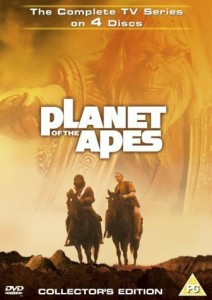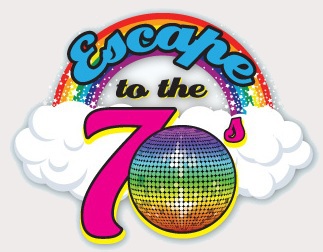 Planet of the Apes – 1974
Planet of the Apes – 1974
14 x 50 Minute Episodes
Starring
Ron Harper
James McNaughton
Roddy McDowell
Booth Colman
Mark Lenard
Review by Kurt Messick
After the success of the ‘Planet of the Apes’ film franchise, and after several films had brought the storyline almost full circle, it seems with hindsight only natural for the producers and studio to decide to extend the success of this series onto television. The experiment was short-lived, as the ‘Planet of the Apes’ television series only lasted for half a season (American standard). The shows were very popular in Britain and other nations, but without an American audience (and American advertising dollars coming into the studio), the series was destined to be one of those interesting, irritatingly half-complete storylines.
The special effects in the series were fairly well done, considering items such as the make-up technology (which won awards in the cinematic productions) and sets such as the central ape city were hold-overs from the films. Another carry-forward was Roddy McDowall, who played the leading ape character in most of the films – in the television series, he reprises a similar role, but one with a different history and motivation. The characters of Dr. Zaius, chief scientist and ‘defender of the faith’, and General Urko, a militant gorilla (‘the only good human is a dead human’) are also characters held over from the films.
The plot is same as the beginning of the film series – American astronauts somehow land on the earth of the distant future, a thousand years or so, in a post-apocalyptic world where human civilisation has been virtually destroyed, and a dominant race of apes has supplanted them as the authority in the world. Unlike the early films, the humans in this alternate world can talk, read, and live in parallel communities with the apes, although always to varying degrees under ape control and subjugation. There are tantalizing bits of archaeological information that lead the senior apes (Dr. Zaius and a few of his confidants) to the understanding that humans once ruled the world to a much greater degree than the apes, with better technology; however, one understanding central to the ape belief structure is that humankind must be kept subordinate, as the humans are the only species to kill its own kind, and practically destroyed the world in which they (and the predecessors of the apes) lived. Astronauts thus represent a grave threat to the new ape world order – they represent a technological superiority that might infect the humans with ideas of equality.
Thus, Planet of the Apes becomes a morality tale in many ways – rigid beliefs going against common sense, ideas of racial inequality built on prejudice (there is even a minor plot device of prejudice of certain kinds of apes against others – gorillas, orangutans, and chimpanzees often mistrust each other, uniting at times it seems only in their common disdain for humans).
The first episode of the series introduces two new astronaut characters (the most famous of whom, from the first film, was played by Charleton Heston). These two astronauts (a third died in transit, again an idea taken from the films) are Virdon and Burke, played by Ron Harper and James Naughton. After crashing, they are found by sympathetic humans who help hide them; when captured, they escape with the help of an ape named Galen (McDowall), whose common sense forces him to recognise the truth in what the astronauts are saying. Galen, Virdon and Burke then begin a life on the run, both working to stay alive and out of the clutches of Urko (Mark Lenard, perhaps best known for playing roles on Star Trek, including Spock’s father, Sarek), and working to find a computer or other technological aid that might get them back home.
There are fourteen episodes in all; these include episodes in which the astronauts introduce techniques of better farming to poor rural folk, new ideas of disease control when a village is struck by malaria, and even build a hang glider to escape from a chimpanzee who wants to use an archaeological find (fragmentary bombs) with the glider for an aerial bombardment against central city. The episodes are fairly formulaic – a problem is presented that hinges upon poor understanding of human potential or previously-known scientific/technological knowledge; either a human or an ape distrusts the trio; the three eventually win over the skeptics with their abilities and basic decency, and then they must run again to avoid discovery.
It is unclear where the series was going to go, had it continued. It was cancelled in mid-season, and the final aired episode literally leaves the astronauts and Galen adrift in the sea, having escaped the authorities once again after having proven their technological superiority. Even with the formula nature of the series, the shows were worthwhile in many respects. I recall seeing this on television first when I was ten years old – to a young person, the plots illustrate their points in the way that fables work (most of the episodes are stories with a moral). When I watched the episodes again via DVD (all fourteen produced are available, including one which was never aired during the original broadcast run), they stood the test of time fairly well. Unlike the original Star Trek series, which, thanks to sets and costumes can often seem very dated, this series has a bit more timelessness to it (although the acting and production values are very much product of the 1970s).
For those who like science fiction in general, and the Planet of the Apes franchise in particular, this is a good series. It might even have some appeal for those who like a bit of fantasy or post-apocalyptic adventure of a very G-rated variety. The DVD has a few extra features – some episode commentaries, and a few theatrical trailers (for the original series of films, and for the more recent remake starring ‘Marky’ Mark Wahlberg). As a blast from the past (as I remember certain portions of the series, including the final drifting away, quite vividly), watching these was a great treat.






Have Your Say.....
If you have any information or thoughts on this page, please help us by popping them in the comment box below.